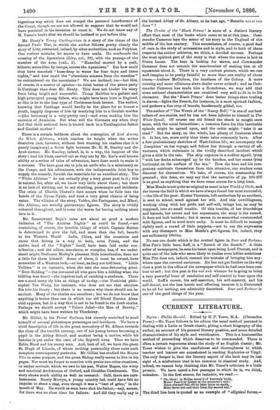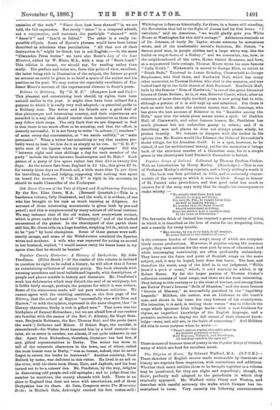CURRENT LITERATURE.
Byron : Childe Harold. Edited by H. F. Tozer, M.A. (Clarendon Press.)—Mr. Tozer follows in his editon the usual method pursued in dealing with a Latin or Greek classic, giving a short biography of the author, an account of his general literary position, and some detailed characteristics of his style and versification. This is a businesslike method of proceeding which deserves to be commended. There is often a certain vagueness about the study of an English classic ; Mr. Tozer wishes to give the carefulness and thoroughness to which teacher and learner are accustomed in reading Sophocles or Virgil. The only danger is, that the literary aspect of the book may be lost sight of, a misfortune that is too common in classical study. And, indeed, we cannot help thinking that Mr. Tozer's criticism is a little prosaic. We have noted a few passages in which he is, we think, mistaken. In the first stanza, for instance, we read :- " Oh, thou! in Hellas deem'd of heavenly birth, Muse! fam'd or fabled at the minstrel's vrill Since shamed full oft by later lyres on earth, Mine dares not call thee from thy sacred hill."
The third line here is quoted as an example of "elliptical forms,— omission of the verb." " Since thou haat been shamed " is, we are told, the full expression. But surely "since" is a temporal adverb, not a conjunction, and contrasts the participle "shamed " with " deem'd " and " fam'd or fabled." The other is a really im- possible ellipsis. Some of Byron's phrases would have been better described as solecisms than peculiarities. " All that was of their destruction is," might be Greek, but is not English.—In the same "Clarendon Press Series" we have also Scott's Lay of the Last Minstrel, edited by W. Minto, MA., with a map of "Scott-Land." This edition is meant, we should say, for reading rather than study. The preface and notes are, from this point of view, excellent, the latter being rich in illustration of the subject, the former as good an account as could be given in so brief a space of the author and his position as his poet. We may notice the especially excellence of Pro- fessor Minto's account of the supernatural element in Scott's poem.















































 Previous page
Previous page